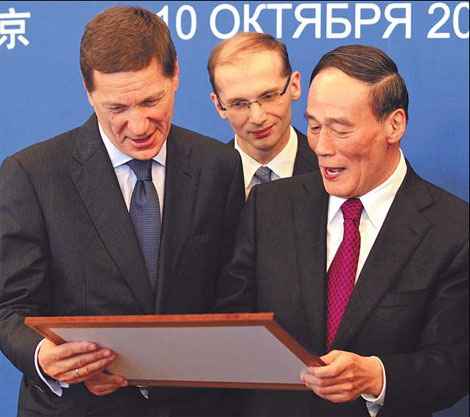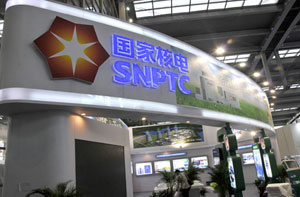Putin visit a herald of closer relations
Updated: 2011-10-11 09:17
By Ding Qingfen and Li Xiaokun (China Daily)
|
|||||||||||
|
Chinese Vice-Premier Wang Qishan and his Russian counterpart Alexander Zhukov looking at a photo during the sixth China-Russia Economic and Business Summit in Beijing on Monday. In 2010, bilateral trade grew 43.1 percent year-on-year to $55.45 billion. [Photo/China Daily] |
Officials agree on investment, trade deals to combat effect of global crisis
BEIJING - China and Russia signed a package of trade and investment agreements worth $7.1 billion on Monday, while high-level officials from both sides pledged to strengthen economic cooperation amid the global debt crisis.
One day before the start of Russian Prime Minister Vladimir Putin's official visit to China, businessmen from China and Russia signed 16 economic and trade cooperation deals, mainly in the new energy, mining, machinery, vehicle, electronics and agricultural sectors.
"China and Russia are both committed to conducting a transformation of their economic development, and there is a strong willingness on both sides to enhance bilateral economic cooperation," said Chinese Vice-Premier Wang Qishan, speaking at the opening ceremony of the sixth China-Russia Economic and Business Summit in Beijing on Monday.
"We suggest the two nations expand mutual investment and promote a wider range of cooperation in the sectors of new energy, energy conservation and environmental protection, high technology, advanced equipment, bio-pharmaceuticals and information technology," he said.
At the invitation of Chinese Premier Wen Jiabao, Putin is scheduled to start a two-day official visit on Tuesday, attending the 16th regular meeting between the two countries' premiers.
This is his first trip abroad since announcing he would seek to regain the nation's presidency. Accompanied by a 250-member delegation including top business leaders, Putin will meet top Chinese leaders including Chinese President Hu Jintao.
During Putin's meeting with Wen, China and Russia are to sign a "cooperative memorandum for economic modernization" to further clarify the approach to bilateral economic cooperation, said Wang.
While European nations are struggling with debt woes and the United States is slogging through a slow economic recovery, closer cooperation between emerging markets such as China and Russia is becoming increasingly important, said Jiang Yi, an expert on Russian studies at the Chinese Academy of Social Sciences.
In 2010, China-Russia trade grew by 43.1 percent year-on-year to $55.45 billion, almost reaching the levels recorded before the global crisis, according to China's General Administration of Customs.
China became the largest trade partner for Russia last year.
The two countries have vowed to further boost annual bilateral trade to $100 billion by 2015 and $200 billion by 2020.
From January to August, China-Russia trade surged 43.7 percent year-on-year to $50.8 billion, according to Customs.
"It's very eye-catching, against the backdrop of a weak global economy, and the bilateral trade relies largely on the exchange of raw materials and energy," said Jiang.
It has been widely reported that negotiations on a suspended 30-year deal under which Russia would supply 68 billion cubic meters of Siberian natural gas a year to China could be a priority for Putin's visit.
Alexander Medvedev, deputy chief executive of Gazprom OAO, said China and Russia are far apart on pricing, which is holding up the agreement.
"However, we cannot pin too high hopes on a breakthrough on this issue," Jiang said.
Russia is in the "final stretch" of talks to join the World Trade Organization and might complete the accession process in December, said Russian officials.
Putin said recently that there would be no upheaval in Russia after the March 2012 presidential election, while he urged Europe to deal with the sovereign debt crisis.
He said he would seek foreign investment to drive Russia's "new industrialization".
China's investment in the non-financial sector in Russia rose by 43.8 percent to $594 million last year, with the money going into energy, mining, forestry, manufacturing and infrastructure projects.
For Chinese companies, there is "great potential to tap into infrastructure in Russia as it will host the APEC summit next year, the Winter Olympics in 2014 and the (soccer) World Cup in 2018", said Sun Yao, vice-governor of northeastern Heilongjiang province, which borders Russia.
Li Sicong contributed to this story.














